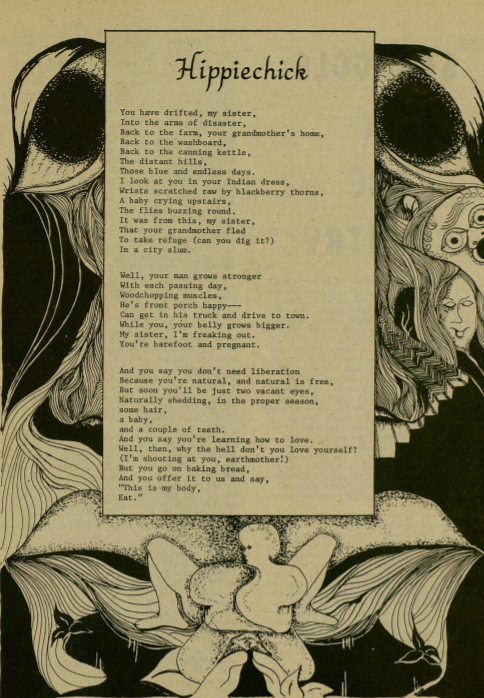
The poem “Hippiechick” by Susan Saxe, originally published in her poetry collection Talk Among the Womenfolk, republished in the 22nd issue of Country Women in 1976 and situated within art of a floral, dreamlike landscape. The poem chronicles the sexist oppression that country women encounter.
There is a prominent ideology stating that city women need feminism most. When we think of feminist issues, these issues are often very city-centric: sexual harassment within the office, women not being able to walk the streets alone at night, gendered wage gaps in white-collar jobs, and more. Because of this, there is an idea that removing oneself from the city will also lessen the burdens of societal oppressions. There is an idea that rural communities are stuck in their ways and happy with them—that rural women’s liberation is a hopeless cause. Saxe’s poem examines exactly why these ideas could not be further from the truth. Women in the countryside do massive amounts of labor—both labor that is seen as traditionally feminine and labor that is not. One rural woman describes their disruption of popular conceptions about the kind of work that farm women do, proclaiming that “contrary to what the Farm Journal and Hoardes Dairyman might lead one to believe, the women on farms in this country are doing a good deal more than baking cherry pies and tending the chickens…they are running big equipment, pulling calves and cleaning barns” (Hoth 3). Women’s role on the farm is not an easy one. On top of raising children and doing housework, these women are helping to run a farm that provides them with sustenance. It is these women, especially, that are in dire need of feminist policies such as wages for housework, more equitable distribution of domestic labor, and free childcare. Susan Saxe appears frightened at the notion of a woman returning to the country, commenting disapprovingly that “you have drifted, my sister, / Into the arms of disaster, / Back to the farm” (17). Likely due to the enormous amounts of labor that women are expected to perform in the country, Saxe equates the farm to the “arms of disaster.” Saxe uses listing to compound the undesirable aspects of country life, describing “wrists scratched raw by blackberry thorns, / A baby crying upstairs, / The flies buzzing round. / It was from this, my sister, / That your grandmother fled” (17). By stacking these responsibilities, Saxe portrays the many duties that rural women are burdened with.
Though the grandmother of the rural woman being referred to fled the country for a better and perhaps easier life, there is clearly an allure to the country that would cause this woman to desire a homecoming. The continual use of the phrase “my sister” connotes commonality between urban and rural women while acknowledging the political consciousness of the rural woman. It is not as if this exchange is one in which the urban woman is proselytizing to an ignorant country woman; this is an exchange between equals with different ideas about liberation. Saxe points out the gendered inequality present in many rural households, decrying that the “man grows stronger / with each passing day” while the woman’s “belly grows bigger. / My sister, I’m freaking out. / You’re barefoot and pregnant” (17). These few lines exemplify the absolute necessity of a feminist ideological presence in the country. It’s true that many rural women exist in states of acute oppression and have a vast quantity of unique issues to be addressed. The effects of many social issues are felt most by people in under-resourced areas, such as the rural countryside. This poem embodies the line of deep solidarity felt between women of different identities that was often expressed in feminist poetry; poetry allowed women to connect across boundaries of race, class, sexuality, and place. Saxe begins the last stanza of the poem with a reminder of the necessity of rural women’s liberation, warning that the woman says she does not “need liberation / Because you’re natural, and natural is free, / But soon you’ll be just two vacant eyes” (17). In order to prevent the eventual burnout of these incredibly powerful and hardworking country women, a feminist analysis is necessary. Simply belonging to the land and being connected to nature is not enough to amount to women’s liberation. Women’s liberation must be accomplished across socioeconomic divisions and carried out to the greatest extent in areas where women are traditionally undervalued.
Works Cited:
Hoth, Sandra. “Belonging to the Land.” Country Women, no. 31, Country Women Editorial Collective, 01 Nov. 1978, pp. 2-3.
Saxe, Susan. “Hippiechick.” Country Women, no. 22, Country Women Editorial Collective, 01 Dec. 1976, p. 17.
